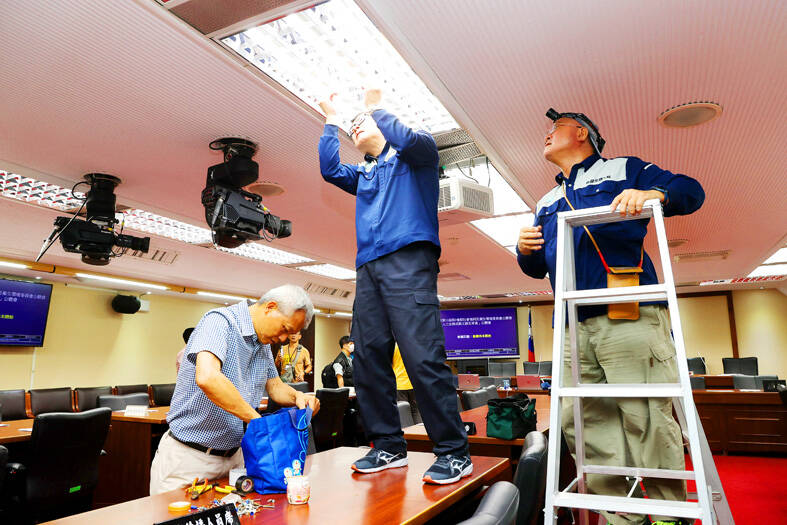Resilience to natural disasters in utilities infrastructure has been built up in large part thanks to the Forward-looking Infrastructure Development Program, which ensured that the east coast still had running water and electricity after Wednesday’s massive earthquake, Democratic Progressive Party (DPP) lawmakers said yesterday.
The temblor was the strongest in Taiwan in 25 years, “but the nation’s electricity grid ran normally, without any large-scale outages,” DPP Legislator Lin Chun-hsien (林俊憲) said.
Although localized outages were reported, the grid remained functioning, Lin said.

Photo: CNA
He credited the performance to the infrastructure program, which was launched in 2017 by then-premier Lin Chuan (林全) during President Tsai Ing-wen’s (蔡英文) first term.
The government provided dedicated funding to build a new generation of infrastructure, including green energy projects, water projects to enhance resilience against climate change, railway projects, digital infrastructure, projects to ensure food safety and other important projects to boost the nation’s resilience, he said.
“The program has improved the nation’s basic infrastructure, allowing every household to have running water and electricity, which our citizens are now taking for granted for their daily necessities,” he said.
Lin said that the Chinese Nationalist Party (KMT) and the Taiwan People’s Party tried to stop the program.
For example, NT$193.9 billion (US$6.05 billion) of government funding was required for water projects, including NT$10 billion to build conduits between dams in southern Taiwan to transfer water to regions to ease water shortages, Lin said.
“I would like to ask those legislators who tried to block funding for the projects if they feel any different today, or if they just take everything for granted,” he said.
Earlier, DPP Legislator Hung Sun-han (洪申翰) said that the government’s strategy to transition to renewable energy helped the nation avoid a large-scale power outage after Wednesday’s quake, unlike the Sept. 21, 1999, earthquake centered in Nantou County’s Jiji Township (集集).
“One of the main reasons electricity remained stable after this week’s earthquake was due to a large increase of solar energy farms across the nation, which ramped up generation right after the temblor to help cover overloading at some coal-fired power plants,” Hung said in an online post.
“In the past, electricity from dams was stored to be released at noon during peak demand. Now, peak times can be covered by solar farms, keeping electricity from dams to release at other times,” he said. “This also helped to cover the power supply when coal-fired plants were disrupted by the earthquake knocking down power lines.”
“Taiwan now has a new power system that is able to make quick adjustments to sudden disruptions, so we have much better equipment in place to respond to emergency situations,” Hung said, adding that these included new energy systems based on gas and water power storage.

Three batches of banana sauce imported from the Philippines were intercepted at the border after they were found to contain the banned industrial dye Orange G, the Food and Drug Administration (FDA) said yesterday. From today through Sept. 2 next year, all seasoning sauces from the Philippines are to be subject to the FDA’s strictest border inspection, meaning 100 percent testing for illegal dyes before entry is allowed, it said in a statement. Orange G is an industrial coloring agent that is not permitted for food use in Taiwan or internationally, said Cheng Wei-chih (鄭維智), head of the FDA’s Northern Center for

LOOKING NORTH: The base would enhance the military’s awareness of activities in the Bashi Channel, which China Coast Guard ships have been frequenting, an expert said The Philippine Navy on Thursday last week inaugurated a forward operating base in the country’s northern most province of Batanes, which at 185km from Taiwan would be strategically important in a military conflict in the Taiwan Strait. The Philippine Daily Inquirer quoted Northern Luzon Command Commander Lieutenant General Fernyl Buca as saying that the base in Mahatao would bolster the country’s northern defenses and response capabilities. The base is also a response to the “irregular presence this month of armed” of China Coast Guard vessels frequenting the Bashi Channel in the Luzon Strait just south of Taiwan, the paper reported, citing a

UNDER PRESSURE: The report cited numerous events that have happened this year to show increased coercion from China, such as military drills and legal threats The Chinese Communist Party (CCP) aims to reinforce its “one China” principle and the idea that Taiwan belongs to the People’s Republic of China by hosting celebratory events this year for the 80th anniversary of the end of World War II, the “retrocession” of Taiwan and the establishment of the UN, the Mainland Affairs Council (MAC) said in its latest report to the Legislative Yuan. Taking advantage of the significant anniversaries, Chinese officials are attempting to assert China’s sovereignty over Taiwan through interviews with international news media and cross-strait exchange events, the report said. Beijing intends to reinforce its “one China” principle

A total lunar eclipse, an astronomical event often referred to as a “blood moon,” would be visible to sky watchers in Taiwan starting just before midnight on Sunday night, the Taipei Astronomical Museum said. The phenomenon is also called “blood moon” due to the reddish-orange hue it takes on as the Earth passes directly between the sun and the moon, completely blocking direct sunlight from reaching the lunar surface. The only light is refracted by the Earth’s atmosphere, and its red wavelengths are bent toward the moon, illuminating it in a dramatic crimson light. Describing the event as the most important astronomical phenomenon